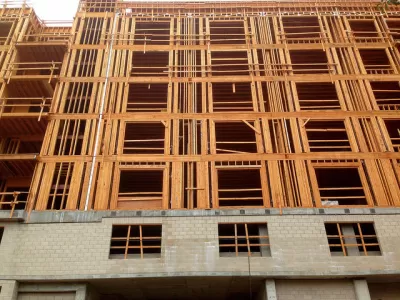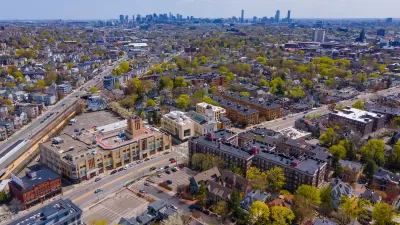Development impact fees in California triple the national average. A bill in the State Legislature would reform the state's development fees, as one measure in an effort to build more housing in the state.

A new study recommends reform for impact fees as a necessary step in response to the housing shortage and housing affordability crisis in California, according to an article by Louis Hansen.
The report [pdf], created by the Terner Center for Housing Innovation at the University of California, Berkeley and published on August 5, 2019 by the state Department of Housing and Community Development, will inform state legislators expected to debate the state's development fees.
"Cities depend on impact fees to build roads, schools and maintain parks and water systems," according to Hansen. "The money also allows municipalities to recoup costs for staff time spent on the projects. In an earlier study, Terner Center researchers found impact fees increased the cost of new units in some cities by up to 18 percent. California’s fees were nearly triple the national average."
"The report also recognized that California cities, limited in raising property taxes by Prop 13, lean heavily on impact fees to pay for services and upgrades to roads and utilities."
Assemblymember Tim Grayson, D-Concord, "plans to amend a bill on impact fee reform, AB 1484, to include recommendations from the report." The bill is on a tight schedule, according to the article—it has to get to Governor Gavin Newsom's desk by September.
Liam Dillon provides additional coverage of the report.
FULL STORY: California housing crisis: Development fees unpredictable, stifle construction

Trump Administration Could Effectively End Housing Voucher Program
Federal officials are eyeing major cuts to the Section 8 program that helps millions of low-income households pay rent.

Planetizen Federal Action Tracker
A weekly monitor of how Trump’s orders and actions are impacting planners and planning in America.

Ken Jennings Launches Transit Web Series
The Jeopardy champ wants you to ride public transit.

Washington Legislature Passes Rent Increase Cap
A bill that caps rent increases at 7 percent plus inflation is headed to the governor’s desk.

From Planning to Action: How LA County Is Rethinking Climate Resilience
Chief Sustainability Officer Rita Kampalath outlines the County’s shift from planning to implementation in its climate resilience efforts, emphasizing cross-departmental coordination, updated recovery strategies, and the need for flexible funding.

New Mexico Aging Department Commits to Helping Seniors Age ‘In Place’ and ‘Autonomously’ in New Draft Plan
As New Mexico’s population of seniors continues to grow, the state’s aging department is proposing expanded initiatives to help seniors maintain their autonomy while also supporting family caregivers.
Urban Design for Planners 1: Software Tools
This six-course series explores essential urban design concepts using open source software and equips planners with the tools they need to participate fully in the urban design process.
Planning for Universal Design
Learn the tools for implementing Universal Design in planning regulations.
Heyer Gruel & Associates PA
Ada County Highway District
Institute for Housing and Urban Development Studies (IHS)
City of Grandview
Harvard GSD Executive Education
Toledo-Lucas County Plan Commissions
Salt Lake City
NYU Wagner Graduate School of Public Service





























